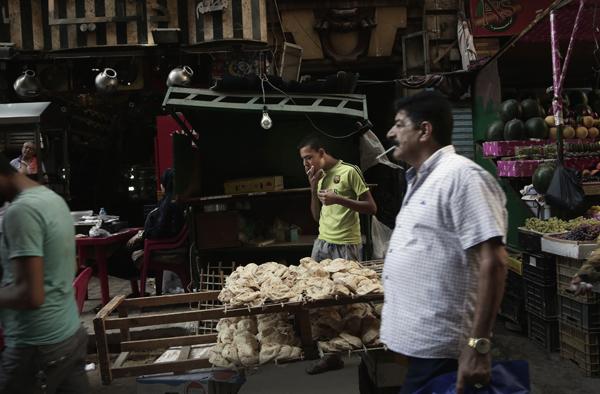You are here
Egypt to cut energy subsidies to spur growth — finance minister
By Reuters - May 14,2014 - Last updated at May 14,2014
AMMAN — Egypt will speed up structural economic reforms this year, led by cuts in energy subsidies, regardless of whether it strikes a deal on International Monetary Fund (IMF) financial aid, Finance Minister Hany Kadry Dimian said this week.
The economy has been hammered by three years of upheaval that followed the 2011 toppling of president Hosni Mubarak, and the government will give priority to crucial tax increases and politically risky cuts to generous state subsidies for fuel.
“We need to get the wheel moving again and this will requires us to reestablish confidence in the Egyptian economy, primarily through comprehensive structural reform measures,” Dimian told Reuters in an interview on the sidelines of an IMF conference in Amman.
He said Egypt had an “ambitious programme to streamline energy subsidies coupled with tax reforms that helps broaden the tax base and promote a fully fledged value-added tax system,”
Dimian, who took office last February, said the first phase of the energy reforms could begin as early as next autumn, when the government introduces a smart card that would control the amount of fuel distributed at a subsided price.
The move could save around 1 per cent to 1.5 per cent of the country’s $262.8 billion gross domestic product (GDP) this year alone, he indicated.
The IMF estimates Egypt’s energy subsidies amount to three times the spending on education and seven times the expenditure on health.
Heavy spending on energy subsidies takes a heavy toll on the economy, consuming a fifth of all state spending, but raising energy prices could trigger protests.
Dimian recently said that spending on energy subsidies next year will be 10 per cent to 12 per cent above the 130 billion Egyptian pounds ($18.6 billion) budgeted for in the current fiscal year unless immediate reforms are made.
The reforms will happen regardless of whether a deal is worked out with the IMF after a presidential election in Egypt this month, Dimian noted.
“We will be evaluating the situation to see if there is a need to conclude this programme of financial support [with the IMF] or whether we just confine ourselves to the reforms we conclude [on our own],” he said.
The IMF and Egypt have sporadically discussed a loan worth up to $4.8 billion to help the economy, which was hurt by political turmoil that drove away tourists and foreign investors, two major sources of foreign currency.
Masood Ahmed, the IMF’s director for the Middle East and North Africa, said the world body had sent two technical missions to Egypt so far to discuss tax reforms, and was ready to extend aid once the government decided it was needed.
“At the moment, the Egyptians have not asked for financing from the IMF, but we have indicated to them that we would be ready to provide financial support as soon as Egyptian authorities feel that would be useful,” Ahmed said on Tuesday.
Aid from the Gulf has reduced the pressure on Egypt to reach a deal with the IMF that would require economic reforms the government might find politically risky, analysts say.
Dimian said Egypt’s economy could not keep to relying on the billions of dollars of Gulf aid in the form of cash transfers, oil shipments and central bank deposits extended after the army toppled Islamist president Mohamed Morsi last year.
“The aid came at a decisive time, but from the point of view of designing economic policies, these policies are not designed at all on the continuation of this aid,” Dimian said.
The cash injections are keeping the economy afloat and allowing Egypt to increase some spending on investments, but analysts say the government still needs a long-term plan to ensure financial stability.
According to Dimian, the priority of economic decision makers was tackling structural imbalances to restore the investor confidence crucial to sustainable growth.
The 2014 growth forecasts remained around 2 to 2.5 per cent, down from a target of 3 to 3.5 per cent. But growth could rise to between 3 and 3.25 per cent in 2015, fuelled by faster economic activity and much less aid from the Gulf, Dimian said
“Growth might go better, but this is what how we read it for the time being,” he said.
Economic growth had been running at 6 per cent to 7 per cent before the protests, although even that pace was barely enough to produce work for the youths entering the job market.
Related Articles
In his first 100 days in office, Egyptian President Abdel Fattah Al Sisi has made a fast start on economic reform: slashing costly fuel subsidies, raising taxes and devising infrastructure projects to secure long-term revenues and ease unemployment.
CAIRO — Egypt is on track to end subsidies on most fuels by June 15 as part of a reform programme led by the International Monetary Fund (IM
CAIRO –– The International Monetary Fund (IMF) has reached an initial agreement with Egypt for $12 billion in funding over three years, the


















